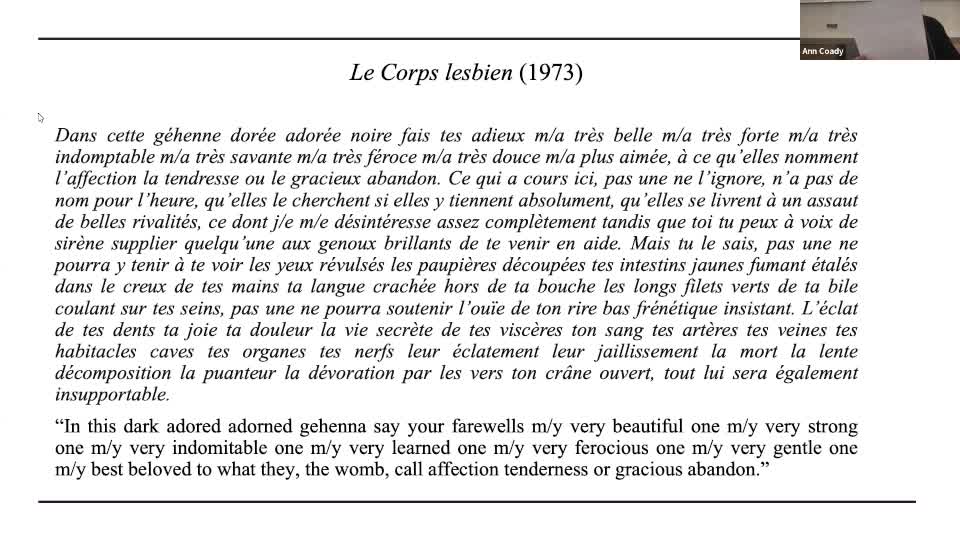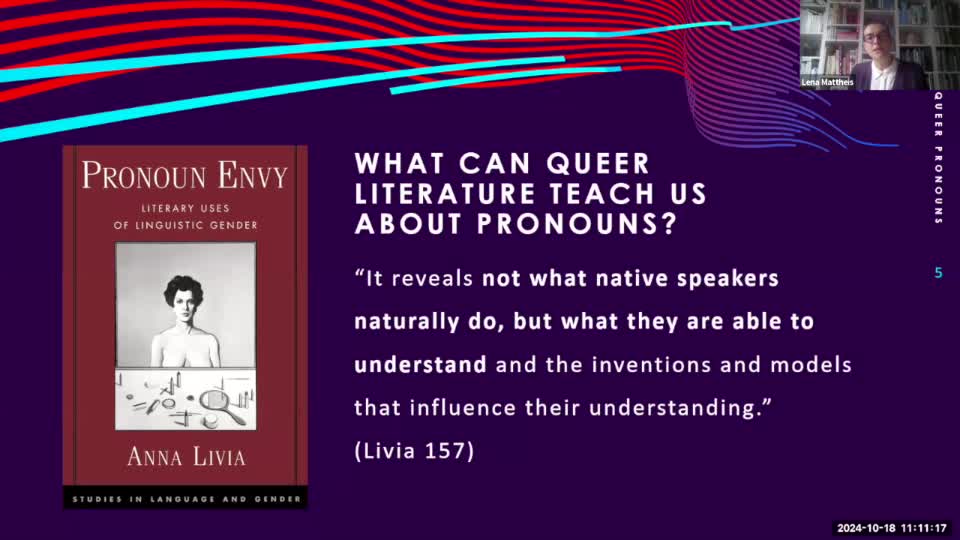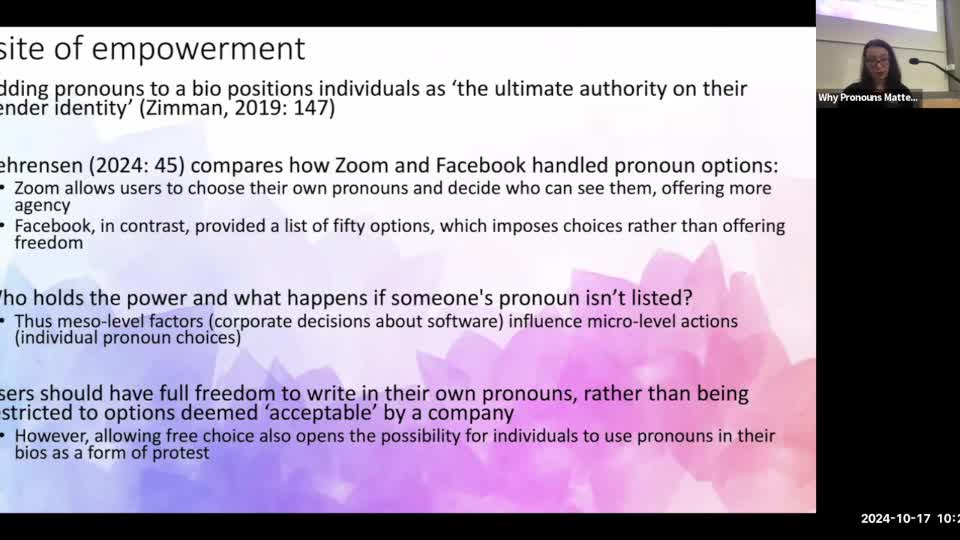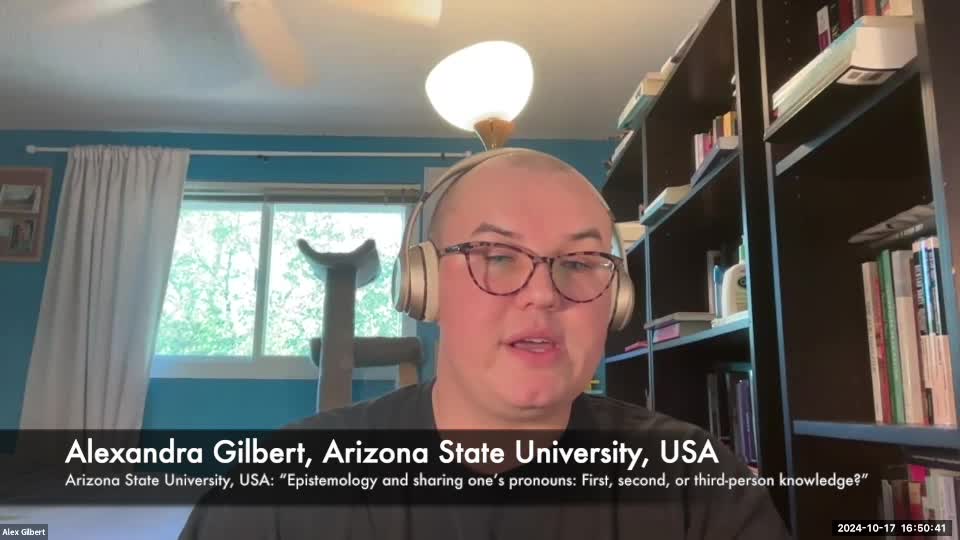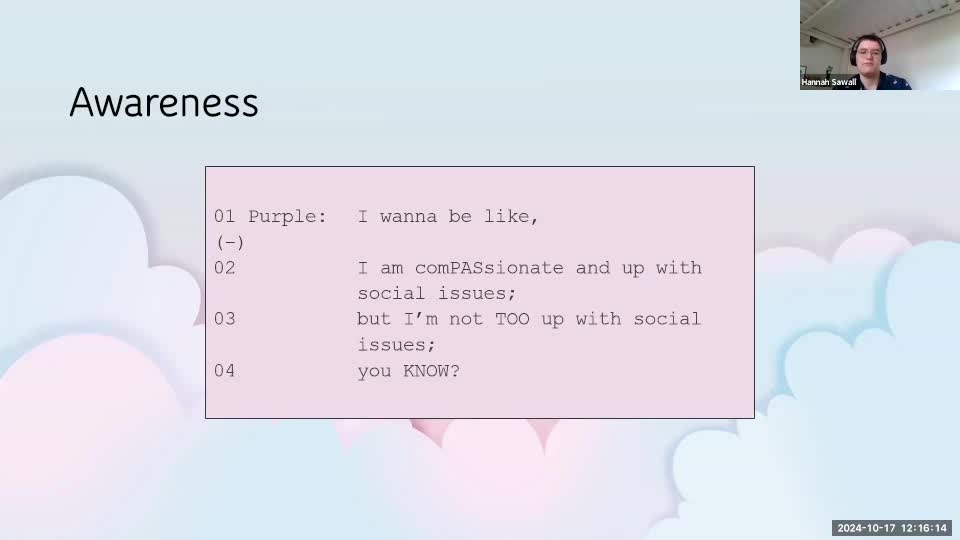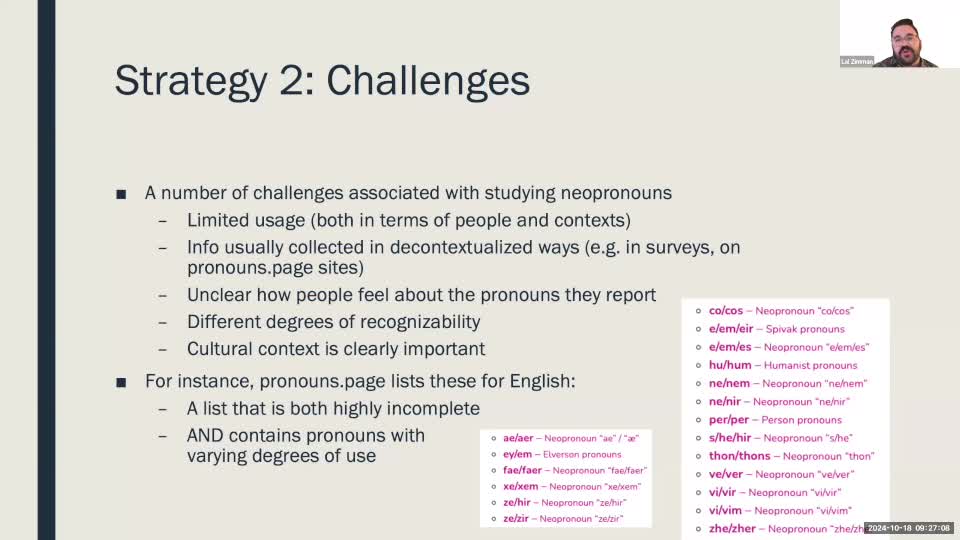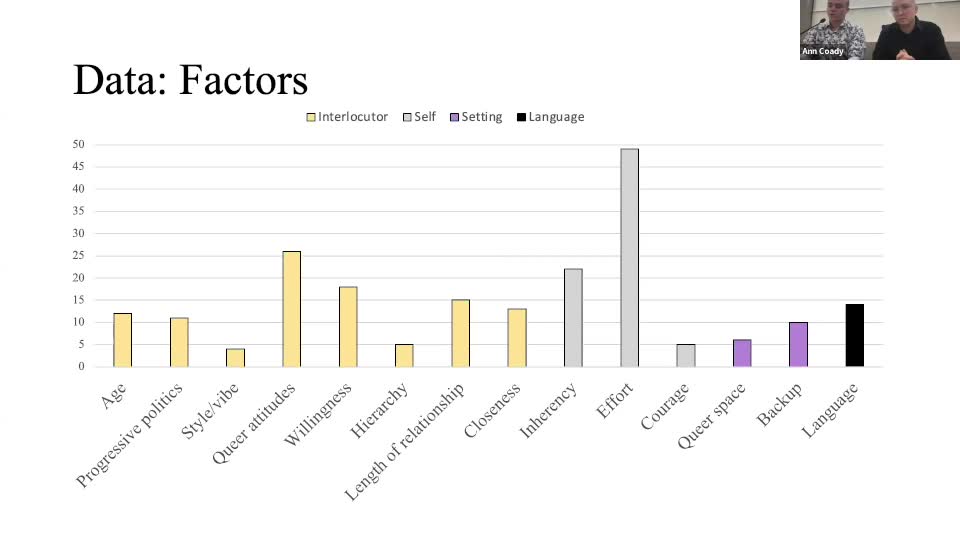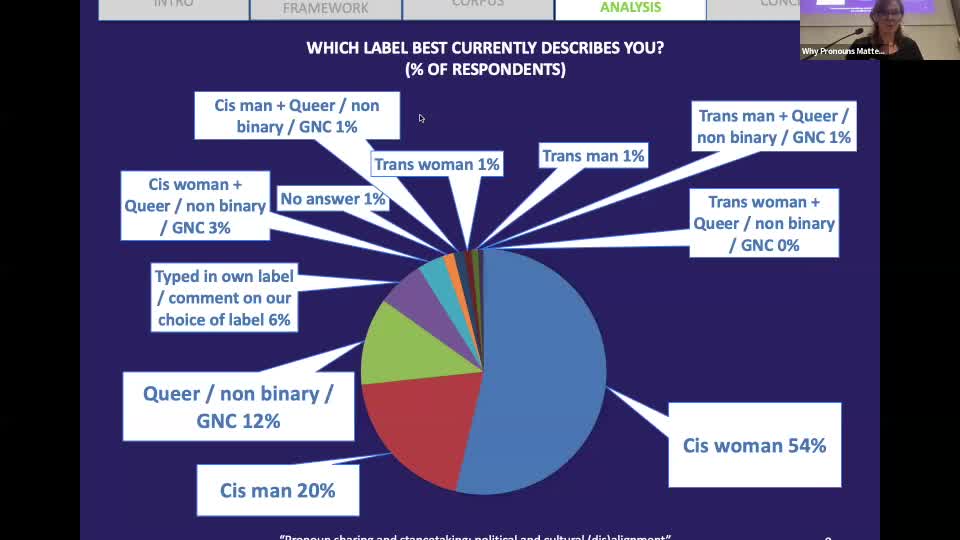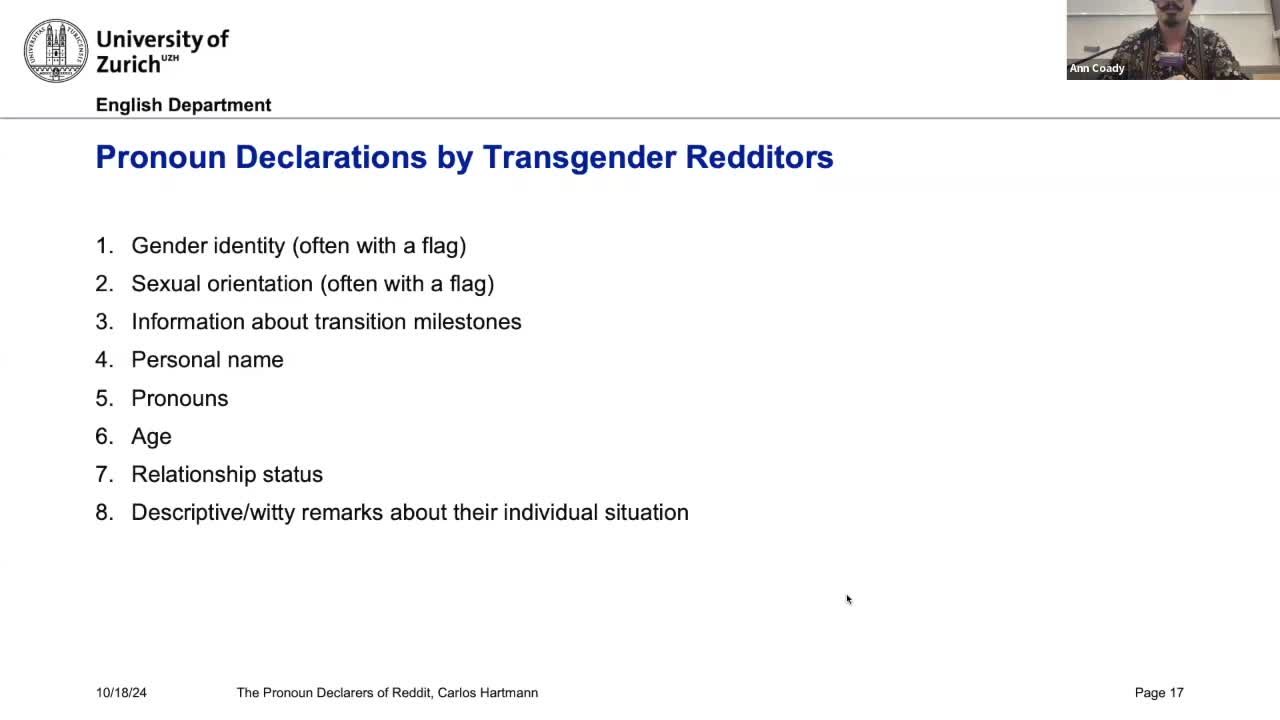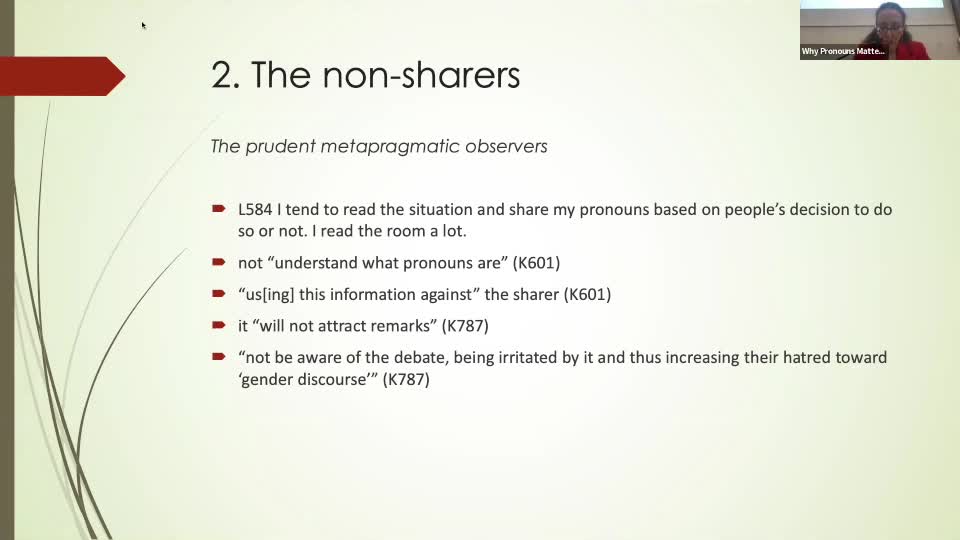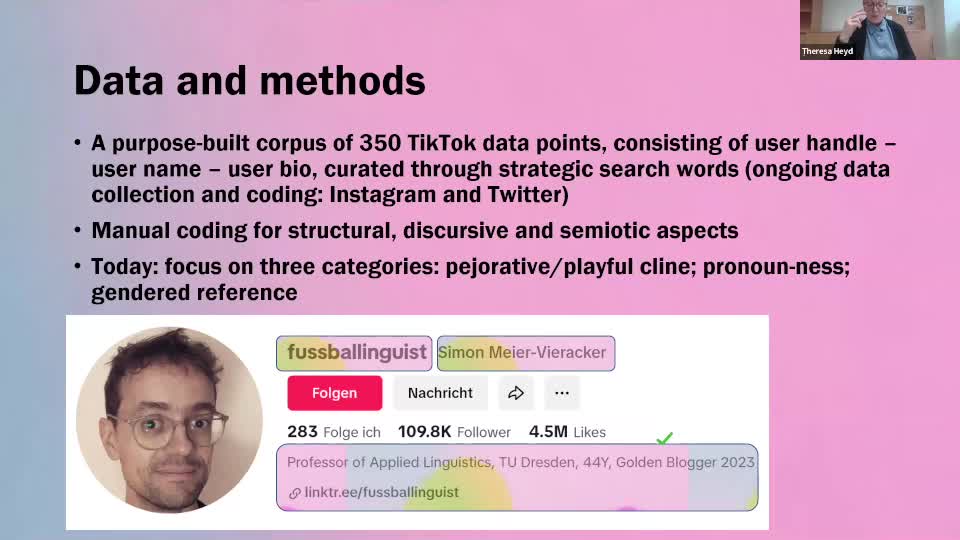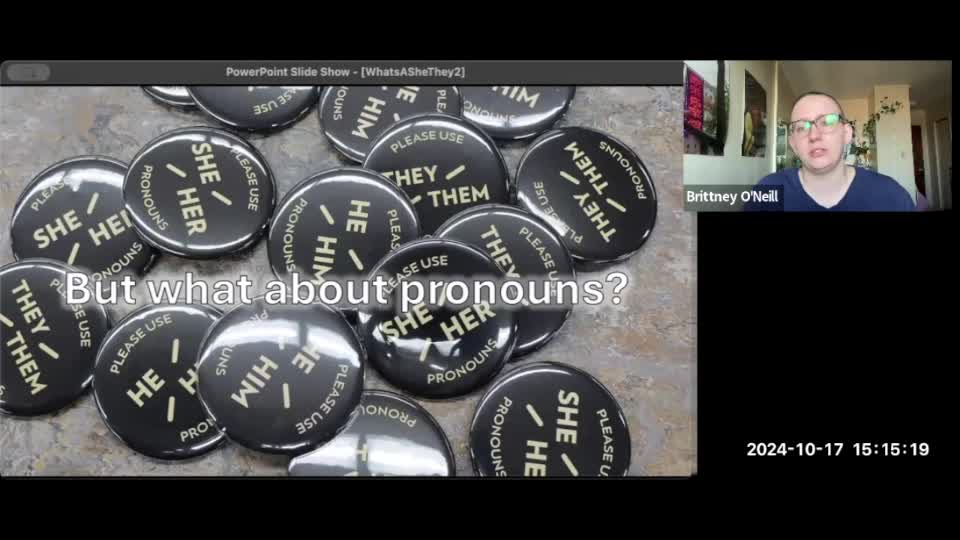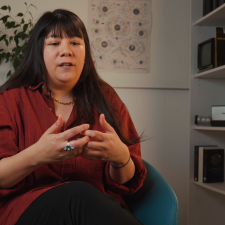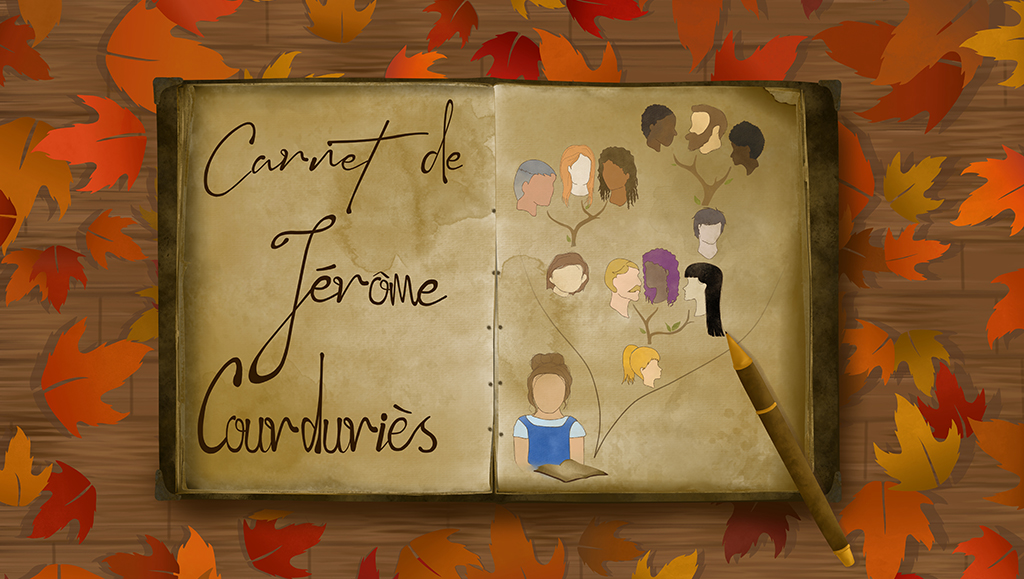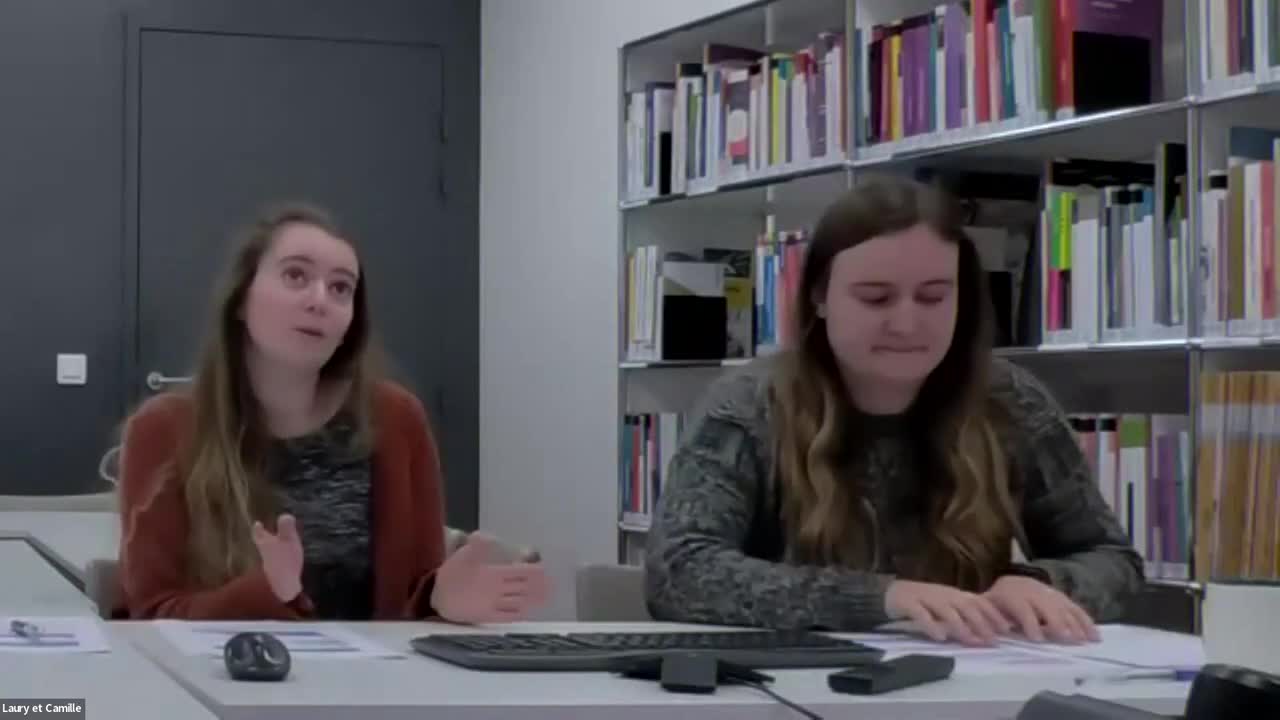Notice
““Wait, what are your pronouns, sorry?”: Conversation analysis of pronoun requests in comedians’ crowd work on TikTok”, Katie Slemp, York University, Canada
- document 1 document 2 document 3
- niveau 1 niveau 2 niveau 3
Descriptif
Comedians on TikTok frequently show videos of their crowd work, where they ask questions to the attendees. While this is not part of their structured stand-up, it allows for spontaneous interaction (although the videos might be edited, censored, and/or captioned on TikTok), which may contain ‘trouble sources’ and opportunities for linguistic repair (e.g., Kitzinger, 2012). In the video from Zelnick (2023), there is seemingly a ‘subject-side’ (e.g., Stokoe, 2011) concern of being gender-aware, or to use Zelnick’s word, an “ally,” seen in the text over the video, such as “throwing my water bottle out of poor allyship” (Zelnick, 2023, 1:27).
1 Lucas: Are you, (um:) goth? Is that correct? (.)
2 Did you have to come out? Like, how did you know?
3 Raven: My parents named me Raven and I just like leaned into it.
11 Lucas: You know what is annoying about your mom? = If she doesn’t want you
12 to be trans why the fuck did she give you a sick trans name? hhh
13 (.) My apologies madame
14 Raven: It’s the other way.
15 Lucas: (.) Wait? What are your pronouns, sorry?
16 Raven: He/him.
17 Lucas: He/him. FU::CK! NO::::::!
In this example of other-initiated repair, which is less preferable than self-initiated (Brown & Levinson, 1987), Zelnick responds by shouting profanity, upset that his “allyship” has been challenged. This marked repair, where the speaker includes a repair solution and an apology, provides overt clarity with a correct category. It is interesting that the initial questions (lines 1-2) are similar to a pronoun request, but the pronoun request occurs much later in the interaction (line 15), as part of the repair. The gender category of the participant takes lower precedence than an aesthetic categorization, and the investigation of pronoun requests from the stage provides insight into conversation analysis involving humor, and repair in response to challenged allyship.
Dans la même collection
-
“Pronouns, past struggles, new practices: political continuity or radical change?”, Claudine Raynau…
RaynaudClaudineI would like to compare two second wave French feminists’ thought and LGBTQIA+ theorizing and practice regarding pronouns and ponder their possible interactions. My focus will be the work of Luce
-
“Gendernonconforming Pronouns in Literature”, Lena Mattheis, University of Surrey, UK
Queerly reshaped pronouns, forms and narrative strategies are flourishing in contemporary non-binary, trans and queer literature. From singular ‘they’ to ‘it’ to neopronouns to the collective voice of
-
“Pronouns in bio: A site of empowerment, validation, struggle, performance, distraction, and corpor…
Pronouns in bio: A site of empowerment, validation, struggle, performance, distraction, and corporate rainbow washing?
-
“Epistemology and sharing one’s pronouns: First, second, or third-person knowledge?”, Alexandra Gil…
In this paper, I consider sharing one’s pronouns as an act that asserts self-knowledge and positions oneself in relation to an addressee and a shared social landscape: see me this way, interact with
-
““Mein Name ist Lena und meine Pronomen sind she/her”: Exploring Indexicalities of Pronoun Sharing …
Since pronoun sharing has been associated with different political stances from virtue signaling to trans liberation, it is clear that they transport more information than simply how a person asks to
-
"Pronouns, positionality, and power: Institutionalized transphobia, intersectionality and trans-aff…
ZimmanLalThis talk explores the complex role of pronouns in the negotiation of (socio)linguistic justice, leading to the argument that the success of trans-affirming language depends on a broader
-
“Pronouns in Motion: Pronoun variability among Swiss non-binary individuals”, Justyna King and Elij…
Our paper aims to explore pronoun practices and flexibility among Swiss non-binary individuals, by elucidating the factors influencing the pronoun usage of Swiss non-binary people, discerning the
-
“Pronoun sharing and stancetaking: political and cultural (dis)alignment”, Ann Coady, Université Pa…
I begin my presentation by putting current pronoun-sharing practices in political and theoretical context, briefly discussing the current political debate surrounding these practices and comparing
-
“A sociolinguistic case study on the Pronoun Declarers of Reddit”, Carlos Hartmann, Universität Zür…
For this study, I extracted and analyzed Reddit comments featuring pronoun declarations within their user flairs, the optional descriptors displayed alongside usernames. The goal was to identify a
-
“What’s in a pronoun and how does it matter?: From the perspective of pragmatics”, Sandrine Sorlin,…
SorlinSandrineIn this talk, I wish to give a quick overview of the quite recent ‘pronoun sharing’ trend from a linguistic and pragmatic perspective, going through the new collocations and semantic shifts of the
-
“Mock pronouns”, Theresa Heyd, Universität Heidelberg, Germany
HeydTheresaThis paper gives an account of mock pronouns as a (predominantly digital) discursive practice. The rise of pronouns and pronominal discourse as a gender-inclusive practice has been accompanied by
-
““What’s a she/they?”: An (auto)ethnographic exploration of epistemic justice and the double bind o…
In this paper, I combine autoethnographic reflections with an exploration of epistemic injustice (e.g. Berenstain, 2016; Davis, 2016; Fricker, 2007; Pohlhaus, 2014) to consider how the persistent
Sur le même thème
-
Entretien avec Ariane Mak autour de son ouvrage En guerre et en grève. Enquêtes dans les cités mini…
MakArianeDe 1939 à 1945, le Royaume-Uni a connu plus de 7 000 grèves, en grande partie dans l’industrie charbonnière.
-
Prendre position dans le trouble / Carnet de passages #2
CourdurièsJérômePitzalisJuliaPeyrautLolaMontécotRobinPayssanAlexiComment s’empare-t-on d’une toute nouvelle thématique ? Comment traiter d’un sujet d’actualité mais surtout polémique ? L’expérience de l’anthropologue Jérôme Courduriès s’est construite au travers
-
Grandir dans un monde connecté. Perspectives et pratiques adolescentes
Que font les ados sur les médias sociaux ? Alors que le temps d’écran et les dangers relatifs aux usages du Web sont au cœur des préoccupations des adultes (et de nombreux travaux académiques), force
-
Les bibliothèques ont-elles leur place sur Tiktok ?
Dans cette session, nous profitons du retour d'expérience de Laury Zinsz et Camille Berzosa, agentes du secteur adultes à la bibliothèque multimédia intercommunale d'Epinal, autour de leur pratique du
-
“Pronouns in bio: A site of empowerment, validation, struggle, performance, distraction, and corpor…
Pronouns in bio: A site of empowerment, validation, struggle, performance, distraction, and corporate rainbow washing?
-
“Pronouns, past struggles, new practices: political continuity or radical change?”, Claudine Raynau…
RaynaudClaudineI would like to compare two second wave French feminists’ thought and LGBTQIA+ theorizing and practice regarding pronouns and ponder their possible interactions. My focus will be the work of Luce
-
“What’s in a pronoun and how does it matter?: From the perspective of pragmatics”, Sandrine Sorlin,…
SorlinSandrineIn this talk, I wish to give a quick overview of the quite recent ‘pronoun sharing’ trend from a linguistic and pragmatic perspective, going through the new collocations and semantic shifts of the
-
““What’s a she/they?”: An (auto)ethnographic exploration of epistemic justice and the double bind o…
In this paper, I combine autoethnographic reflections with an exploration of epistemic injustice (e.g. Berenstain, 2016; Davis, 2016; Fricker, 2007; Pohlhaus, 2014) to consider how the persistent
-
“Mock pronouns”, Theresa Heyd, Universität Heidelberg, Germany
HeydTheresaThis paper gives an account of mock pronouns as a (predominantly digital) discursive practice. The rise of pronouns and pronominal discourse as a gender-inclusive practice has been accompanied by
-
“Pronouns in Motion: Pronoun variability among Swiss non-binary individuals”, Justyna King and Elij…
Our paper aims to explore pronoun practices and flexibility among Swiss non-binary individuals, by elucidating the factors influencing the pronoun usage of Swiss non-binary people, discerning the
-
“A sociolinguistic case study on the Pronoun Declarers of Reddit”, Carlos Hartmann, Universität Zür…
For this study, I extracted and analyzed Reddit comments featuring pronoun declarations within their user flairs, the optional descriptors displayed alongside usernames. The goal was to identify a
-
““Mein Name ist Lena und meine Pronomen sind she/her”: Exploring Indexicalities of Pronoun Sharing …
Since pronoun sharing has been associated with different political stances from virtue signaling to trans liberation, it is clear that they transport more information than simply how a person asks to


